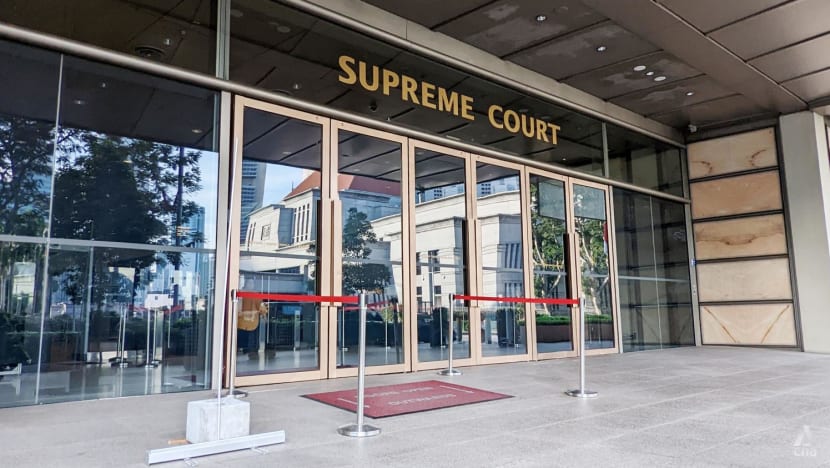Convicted sex offender gets shorter jail term after representing himself at Court of Appeal
The Court of Appeal reduced the man's jail term by five-and-a-half years.

The Supreme Court entrance on Sep 23, 2022. (File photo: CNA/Try Sutrisno Foo)
SINGAPORE: A former gang member who appealed against a sexual assault conviction managed to reduce his jail term on Tuesday (Oct 3), although he failed to overturn the guilty verdict.
Mustapah Abdullah, 51, was convicted of sexually assaulting three teenage boys at a playground slide in 2018.
He was sentenced to 23 years in jail and an additional one year in lieu of caning. He cannot be caned as he is above 50 years old.
On Tuesday, his sentence was reduced to 18 years and six months in jail, which is five-and-a-half years shorter.
Mustapah, who had no lawyer in both his trial and the appeals process, contested his conviction and sentence at the Court of Appeal.
A panel of three judges upheld his conviction, but shortened his sentence after adjusting the aggravating factors and how many of the jail terms for each of his three charges should run concurrently.
A key disagreement with the trial judge's finding was that Mustapah had not abused his trust or authority over the victims, and that the victims were not vulnerable individuals.
The three victims were aged 16 to 17 during the offences. They lived in the same neighbourhood as Mustapah and got to know him around 2017.
Whenever they met up, Mustapah was friendly and would tell the victims about his past experiences. The three teens knew that he was an ex-convict and former gang member.
They saw him as a close friend and thought of him as a "big brother", according to court documents.
But this did not mean that Mustapah was in a position of responsibility in relation to the victims, said Justice Judith Prakash, delivering the Court of Appeal's decision.
Abuse of trust and authority covers situations where the offender is in "a position of responsibility" to the victim, or where the offender is a person in whom the victim has placed trust by virtue of their occupation.
The relationship between Mustapah and the victims was different from that in a family, where a "clear hierarchy" exists between family members. He was also not in a "quasi-parental" position to them.
They merely shared a close friendship before the offences, and there was no abuse of trust and authority in this case, said Justice Prakash.
The appellate judges also disagreed that the three teenage victims were vulnerable.
They noted that a victim may be vulnerable because of age, physical frailty, mental impairment or disorder, or learning disability. When it comes to age, a younger victim is likely to be considered more vulnerable.
"The victims here were not particularly young teenagers, being in their later teenaged years, and none of them was subject to any disabilities that would render them more vulnerable.
"Vulnerability must also be assessed by considering personal circumstances such as whether the victims were helpless as they had run away from home," said Justice Prakash, noting that there were no such issues here.
"Also, given that the victims had interacted with gangsters previously, they were not so innocent or naive such that they were susceptible to exploitation" by the offender, she said.
In the lead up to the sexual assaults, Mustapah had slapped and kicked the victims and issued various threats to them, the judge noted.
The fact that they were quick to comply with his demands in the sexual assaults meant they were afraid of him, and did not necessarily demonstrate vulnerability, she said.
The appellate judges did not disturb a third aggravating factor found by the trial judge, which was Mustapah's verbal intimidation and use of physical violence against the victims.
But without the other two aggravating factors, they found that there should have been a lower starting point in the jail term for each offence of sexual assault.
They also adjusted his global sentence so that only two of the sentences for sexual assault would run concurrently, instead of three as the trial judge had ordered.
This way, the sentence is "not disproportionate or crushing" to the offender, while still being enough of a deterrent and corresponding to his overall criminality, they said.
The judges upheld other aspects of the trial judge's sentencing decision, including an extension to the jail term for Mustapah's conduct at trial, where he made sweeping personal attacks on the victims and prosecution witnesses.
They also rejected other arguments that Mustapah made to try and get his conviction thrown out, including his claim that the victims made up the narrative to falsely implicate him and that they had consented to the assaults.

















